- Strengthening Research Culture September 20, 2021
“In much of society, research means to investigate something you do not know or understand. Research is creating new knowledge,” said Neil Armstrong, the first man on the moon. The quest for knowledge creation has consistently pushed researchers and scholars to seek answers to evolving questions. And if there is anything we have learned in the past year, it’s that we are often posed with new challenges that require innovative solutions in today’s world.
The new world has its eyes trained on well-trained researchers, who are problem solvers of tomorrow. Their journey begins at institutions of higher learning, which should not only imbibe research aptitude but also equip them with cutting edge skills to see their projects to logical conclusions. Looking at teaching and research as independent entities can be a considerable loss, and new-age institutions like SRM University-AP are set on avoiding it at any cost.
Research in its DNA
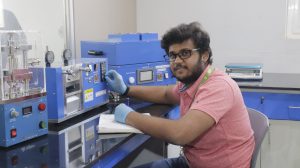 Since its inception, SRM University-AP has been known as a broad-based multidisciplinary research-intensive university. As its Pro-Vice-Chancellor Prof. D. Narayana Rao says, “SRM University-AP provides exciting and challenging research opportunities that are of national and international importance and have social applications.” True to those words, it has developed a lively ecosystem conducive to research, showing the results.
Since its inception, SRM University-AP has been known as a broad-based multidisciplinary research-intensive university. As its Pro-Vice-Chancellor Prof. D. Narayana Rao says, “SRM University-AP provides exciting and challenging research opportunities that are of national and international importance and have social applications.” True to those words, it has developed a lively ecosystem conducive to research, showing the results.The research focus at the University had drawn around 60 scholars from around the world pursuing their PhDs in their areas of interest. In a short span of time, faculty members and students of the University have published over 200 research papers. In 2019-20 alone, eight patents were published, and 5 were applied for under SRM University-AP. The staggering amount of quality output has caught the eye of aspiring researchers and leading institutions alike.
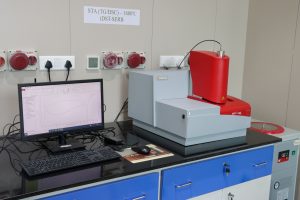
Top names like DST, DBT, BRNS, Government of India and the British Council have sanctioned 24 research projects with a total outlay of Rs. 12.00 crores to faculty members at SRM University-AP. And this seems only the beginning for scholars at the University, who are encouraged by concerted initiatives and growing infrastructure on campus, which has a thriving ecosystem for research pursuits.
- The University has drawn a dynamic pool of faculty members with international exposure. As they work on impactful research, they mentor students and scholars to think creatively and present solutions through projects.
- It is set to create Centres of Excellence on Cloud Computing, Internet of Things (IoT), Artificial Intelligence and Machine Learning, 5G Technologies, Weather Forecast, Satellite Technology, Renewable Energy, Energy Storage Devices, Additive Manufacturing, Gene Editing, and Blue Economy to embrace new technologies.
- Its international collaborations with MIT, the University of California, Berkeley and other renowned foreign universities offer students opportunities to interact with and collaborate with peers and academicians worldwide.
- SRM University-AP has also focused on industry collaborations with powerhouses like TITAN, Amara Raja Batteries Limited (ARBL) for joint research. In fact, it is working with Indian Railways to develop hydrogen-powered fuel cell-based trains.
These and other projects in the pipeline can no doubt have an impact on society. But at the same time, shaping future knowledge creators and problem solvers will be a significant achievement stemming from the research culture on the SRM University-AP campus.
Continue reading → - Innovation in education September 20, 2021
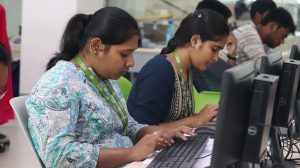
“Innovation is the only way to win,” said Steve Jobs, who certainly knew a thing or two about innovations. With Industry 4.0 and digital disruptions felt across every sector, innovation and creativity are the way forward. Institutions of higher learning that are focused on nurturing winners in varied walks of life have integrated innovation into their modes of learning, curriculum and ecosystem. And SRM University-AP has been leading the way.
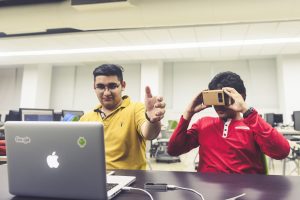 Established as a broad-based multidisciplinary research-intensive university, it has been the flagbearer for innovation in a short span of time. Of course, the unprecedented events of the past year necessitated the integration of innovation into modes of learning and classroom delivery. SRM University-AP was up to the challenge, swiftly transitioning to digital platforms, encouraging engaging pedagogies and novel assessment systems to enhance students’ learning experience.
Established as a broad-based multidisciplinary research-intensive university, it has been the flagbearer for innovation in a short span of time. Of course, the unprecedented events of the past year necessitated the integration of innovation into modes of learning and classroom delivery. SRM University-AP was up to the challenge, swiftly transitioning to digital platforms, encouraging engaging pedagogies and novel assessment systems to enhance students’ learning experience.
But the university’s truly pioneering work lies in fostering an entrepreneurial and innovation-centric aptitude amongst students. Through mentorship from faculty members and industry experts, SRM University-AP has consistently strived to inculcate the values and penchant for innovation and creative solutions amongst students. It has also instated varied clubs and initiatives that promote students pursuits based on innovation.
- The Innovation Cell at the university promotes the active participation of students in numerous activities that put innovative thinking into focus. From participation in events like Toycathon 2021 to Smart Idea contests, it is a buzzing hub of activity.
- ENNOVAB, the Entrepreneurial Innovation Lab is a student-run centre that has added a rich layer to the ecosystem at the university. It was founded by alumni of the Saturdja Center For Entrepreneurship & Technology, University of California Berkeley.
- It will also partner with SRM University-AP and Jacob Center of Design And Innovation to launch the Innovation, Design and Entrepreneurship Academy (IDEA). It will harness the culture for students of liberal arts and sciences, engineering and management.
- SRM Habitat for Research & Innovation in Science (SHRISTI) takes things a step further and has been designed to nourish young and fragile businesses through guidance and resources. It will enable students to develop their business ideas effectively.
- The university is also keen on establishing Centers of Excellence on Cloud Computing, Internet of Things (IoT), Artificial Intelligence and Machine Learning, 5G Technologies, Weather Forecast, Satellite Technology, Renewable Energy etc.
SRM University-AP has been organising seminars and conferences that speak for the values of innovation in every industry sector. Together with these centers and labs, it has thus created an environment where students can ideate, innovate, be creative, and become the changemakers of tomorrow.
Continue reading → - Conference on Number Theory and Related Topics September 17, 2021
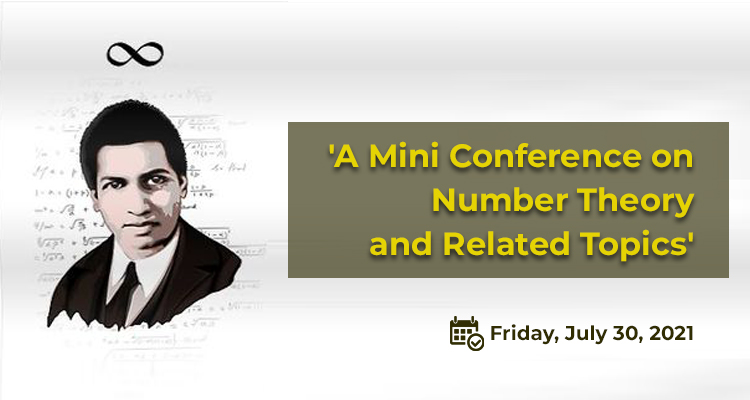 Department of Mathematics, SRM University-AP organised a 3-day conference on Number Theory and Related Topics. The Conference was scheduled for July 30 – August 01, 2021. Distinguished speakers from IMSC Chennai, CMI-Chennai, IIT-Kanpur, Ropar, Indore, Gandhinagar and Delhi, IISER-Bhopal, Pune and Tirupati, Charles University, Prague, University of Zagreb, RKMVERI, Belur took part in the Conference and presented their work and ideas on Number Theory.
Department of Mathematics, SRM University-AP organised a 3-day conference on Number Theory and Related Topics. The Conference was scheduled for July 30 – August 01, 2021. Distinguished speakers from IMSC Chennai, CMI-Chennai, IIT-Kanpur, Ropar, Indore, Gandhinagar and Delhi, IISER-Bhopal, Pune and Tirupati, Charles University, Prague, University of Zagreb, RKMVERI, Belur took part in the Conference and presented their work and ideas on Number Theory.Modern number theory is connected with almost every other branch of mathematics. This Conference is dedicated to exploring different aspects of modern number theory, including modular forms, automorphic forms, representation theory, arithmetic geometry, special functions, diophantine approximations, quadratic forms etc. This Conference aims to encourage young aspiring mathematicians to get a flavour of the broad horizon of number theory.
For more information and to watch the lecture videos, please visit this site.
Continue reading → - The Narasimhan-Seshadri theorem and some of its ramifications September 17, 2021
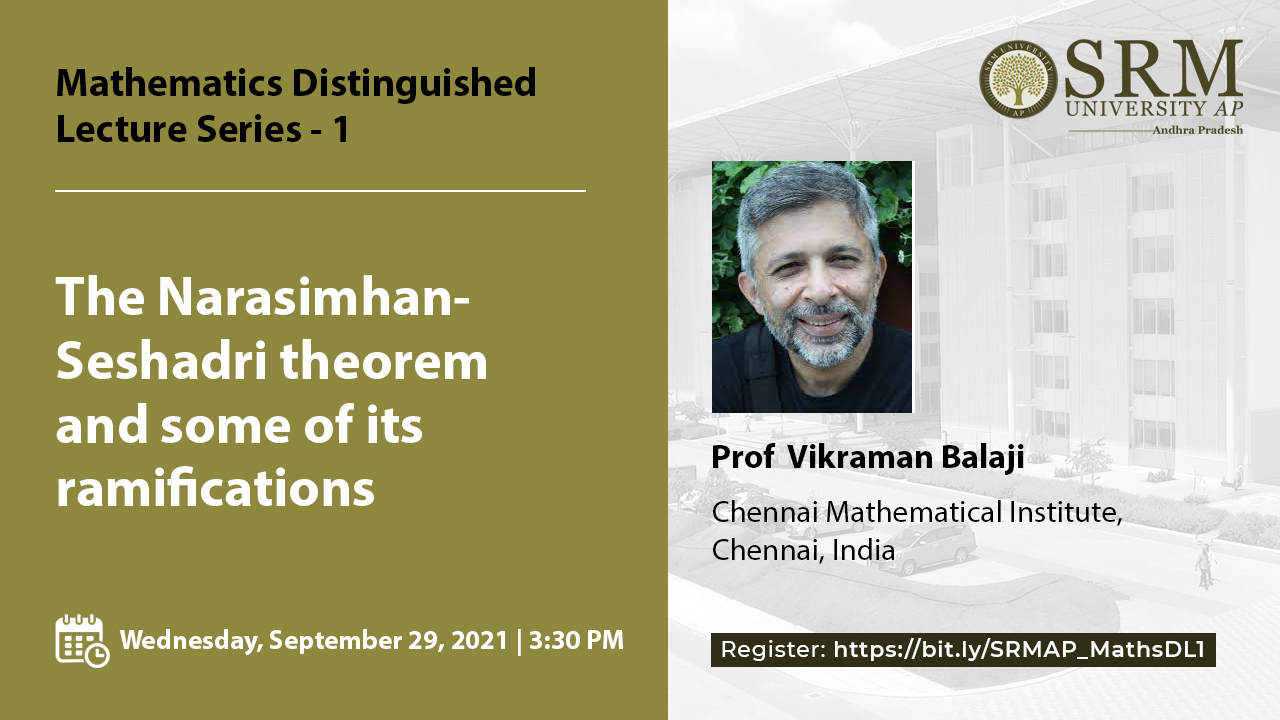 The Department of Mathematics at SRM University-AP organises the first episode of the Distinguished Lecture Series on September 29, 2021, at 3:30 pm. Prof Vikraman Balaji, renowned Mathematician from Chennai Mathematical Institute, Chennai, India will deliver a lecture on the topic “The Narasimhan-Seshadri theorem and some of its ramifications”
The Department of Mathematics at SRM University-AP organises the first episode of the Distinguished Lecture Series on September 29, 2021, at 3:30 pm. Prof Vikraman Balaji, renowned Mathematician from Chennai Mathematical Institute, Chennai, India will deliver a lecture on the topic “The Narasimhan-Seshadri theorem and some of its ramifications”Abstract of the talk:
The Narasimhan-Seshadri theorem is one of the spectacular theorems from India in the past 50 years or so. The theorem is more than a deep result but is in a way philosophy or correspondences and symmetries. The theorem has had an impact on several aspects of mathematics. The theorem has also led to developments along lines that are similar but by themselves are also deep and central. Since the talk is for a general audience, I plan to give an overview of the theorem, a few of its big impacts in topology and geometry and a few of its ramifications in terms of generalizations.
About the Speaker:
Prof Vikraman Balaji is a renowned Indian Mathematician and currently a professor at the Chennai Mathematical Institute, India. He completed his doctorate in mathematics under the supervision of Prof C S Seshadri. His primary research area is algebraic geometry. He has made outstanding contributions to moduli problems over algebraic varieties. In particular, his work on ‘compactification of moduli of principal G-bundles over algebraic surfaces and his joint work with C.S Seshadri on ‘Parahoric torsors’ are very significant among his many other notable works. In 2006, he received the prestigious Shanti Swarup Bhatnagar Award in Mathematical Sciences and was awarded the J.C Bose fellowship in 2009. He was elected Fellow of the Indian Academy Of Sciences in 2007 and Fellow of the Indian National Science Academy (INSA) in 2015. He is presently an elected member of the National Academy Of Sciences, India (NASI).Join this lecture on September 29, 2021, at 3.30 pm to understand the Narasimhan-Seshadri theorem and its impact on Mathematics.
Continue reading → - Third year CSE students innovate efficient plastic recycling technology September 17, 2021
 Swikriti Khadke, Pragya Gupta, and Shanmukh Rachakunta from third-year Computer Science Engineering have published a research paper titled “Efficient Plastic Recycling and Remold Circular Economy using the Technology of Trust – Blockchain” along with their mentors from SRM University-AP Dr Jatindra Kumar Dash, Dr Goutam Kumar Dalapati and Dr Sabyasachi Chakrabortty in the peer-reviewed journal Sustainability.
Swikriti Khadke, Pragya Gupta, and Shanmukh Rachakunta from third-year Computer Science Engineering have published a research paper titled “Efficient Plastic Recycling and Remold Circular Economy using the Technology of Trust – Blockchain” along with their mentors from SRM University-AP Dr Jatindra Kumar Dash, Dr Goutam Kumar Dalapati and Dr Sabyasachi Chakrabortty in the peer-reviewed journal Sustainability.Global plastic waste is increasing rapidly. The strategic management of plastic waste and recycling can preserve environmental species and associated costs. The utilization of plastic can be done by introducing Blockchain during plastic waste recycling. Automation for the segregation and collection of plastic waste can effectively establish a globally recognizable tool using Blockchain-based applications. Collection and sorting of plastic recycling are feasible by keeping track of plastic with unique codes or digital badges throughout the supply chain. Efficient recycling technology is essential to reduce plastic pollution. Many technologies have been employed to enhance plastic recycling. Among them, blockchain is promising for plastic recycling and circular economy (CE). Blockchain, a distributed ledger, consists of some ordered blocks which are unchangeable. This can be considered an exemplary way to push the transactions of their customers under the same blockchain technology. The research group used machine learning techniques to predict plastic generation globally so that they could see the impact it will make in the coming future. The students have used ARIMA – Auto-Regressive Integrated Moving Average for the study.
The potential idea is to utilize an approach wherein recyclers can keep track of generated waste as it moves through the various chains. A platform that works by tracking recycling activities across a local recycling supply chain on the Blockchain. When this will be publicly available, consumers can also use the ledger info to make more informed purchasing decisions. The Blockchain can be utilized to track individual items through the recycling supply chain by creating physical markers like QR codes.
The suggested Blockchain-based platform can be implemented in various nations with an autonomous waste collector and storage system. This process can be expanded to individual collectors and storage systems. The novel process will be created by incorporating a reward-based Blockchain scheme with the collaboration of global businesses and local waste collectors. The proposed model further allows the effective sharing of databases among various supply chains to create a CE.
Talking about the social implications of the research, the students firmly believe that the study will result in the introduction of new technology in the recycling industry and promote awareness about technology in rural areas. Developing a platform and implementing blockchain and other facilities will be the focus of these young innovative brains of SRM University-AP in the forthcoming days.
Read the full paper here: https://doi.org/10.3390/su13169142
Continue reading →

